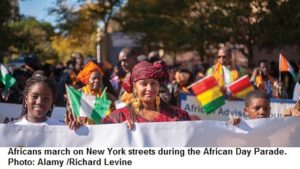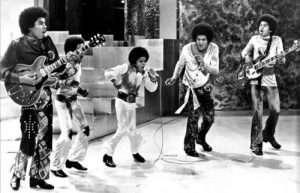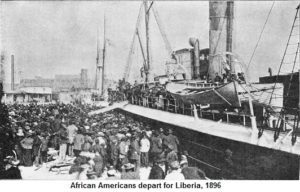Go Lean Commentary
“Go back to Africa”
According to the Urban Dictionary, this phrase is just simply an insult:
- Phrase used when a black person is living in a white country; i.e. Here is England, here is not your land! Go back to Africa!
- An insult used against blacks living in a non-African country.
What people forget when they use it, however, is that in order to “go back” to somewhere, you have to have been born in that place. Most likely, the black who you tried to insult was born in a Western country, and no Western country is located in the continent of Africa.
All in all, this insult is cruel, unkind and unwelcoming. But, for 1 minute, let’s look at this whole issue from an American perspective – African-American more specifically – see how/if/when an American Black person can truly … go “home” to Africa.
One man’s trash is another’s treasure.
The African country of Ghana is rolling out the Welcome Mat for African-Americans. They know that the ancestors of many of these African-Americans may have actually come through the doors of African Slave Trading posts located in today’s Ghana; see the details on Elmira Castle below.
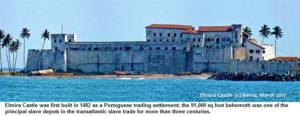
This Welcome Mat is presented by the highest elected official in that land – the President. See the full story here:
Title: 2019: Year of return for African Diaspora
Subtitle: Ghana rolls out the red carpet to encourage resettlement in the motherland
By: Benjamin TettehIn the heart of Accra, Ghana’s capital, just a few meters from the United States embassy, lie the tombs of W. E. B. Du Bois, a great African-American civil rights leader, and his wife, Shirley. The founder of the US-based National Association for the Advancement of Colored People moved to Accra in 1961, settling in the city’s serene residential area of Labone and living there until his death in August 1963.
Mr. Du Bois’s journey to Ghana may have signaled the emergence of a profound desire among Africans in the diaspora to retrace their roots and return to the continent. Ghana was a major hub for the transatlantic slave trade from the 16th to the 19th centuries.
In Washington, D.C., in September 2018, Ghana’s President Nana Akufo-Addo declared and formally launched the “Year of Return, Ghana 2019” for Africans in the Diaspora, giving fresh impetus to the quest to unite Africans on the continent with their brothers and sisters in the diaspora.
At that event, President Akufo-Addo said, “We know of the extraordinary achievements and contributions they [Africans in the diaspora] made to the lives of the Americans, and it is important that this symbolic year—400 years later—we commemorate their existence and their sacrifices.”
US Congress members Gwen Moore of Wisconsin and Sheila Jackson Lee of Texas, diplomats and leading figures from the African-American community, attended the event. Representative Jackson Lee linked the Ghanaian government’s initiative with the passage in Congress in 2017 of the 400 Years of African-American History Commission Act. Provisions in the act include the setting up of a history commission to carry out and provide funding for activities marking the 400th anniversary of the “arrival of Africans in the English colonies at Point Comfort, Virginia, in 1619.”
Since independence in 1957, successive Ghanaian leaders have initiated policies to attract Africans abroad back to Ghana.
In his maiden independence address, then–Prime Minister Kwame Nkrumah sought to frame Africa’s liberation around the concept of Africans all over the world coming back to Africa.
“Nkrumah saw the American Negro as the vanguard of the African people,” said Henry Louis Gates Jr., Director of the Hutchins Center for African and African American Research at Harvard, who first traveled to Ghana when he was 20 and fresh out of Harvard, afire with Nkrumah’s spirit. “He wanted to be able to utilize the services and skills of African-Americans as Ghana made the transition from colonialism to independence.”
Ghana’s parliament passed a Citizenship Act in 2000 to make provision for dual citizenship, meaning that people of Ghanaian origin who have acquired citizenships abroad can take up Ghanaian citizenship if they so desire.
That same year the country enacted the Immigration Act, which provides for a “Right of Abode” for any “Person of African descent in the Diaspora” to travel to and from the country “without hindrance.”
The Joseph Project
In 2007, in its 50th year of independence, the government initiated the Joseph Project to commemorate 200 years since the abolition of slavery and to encourage Africans abroad to return.Similar to Israel’s policy of reaching out to Jews across Europe and beyond following the Holocaust, the Joseph Project is named for the Biblical Joseph who was sold into slavery in Egypt but would later reunite with his family and rule Egypt.
The African-American community is excited about President Akufo-Addo’s latest initiative. In social media posts, many expressed interest in visiting Africa for the first time. Among them is Amber Walker, a media practitioner who says that 2019 is the time to visit her ancestral home.
“It is definitely comforting because that kind of red carpet has not been rolled out by our oppressors in the Western world,” she added.
In making the announcement President Akufo-Addo said: Together on both sides of the Atlantic, we’ll work to make sure that never again will we allow a handful of people with superior technology to walk into Africa, seize their people and sell them into slavery. That must be our resolution, that never again, never again!”
But Ms. Walker took issue with Mr. Akufo-Addo for appearing to downplay the actions of some Africans in the slave trade. “In the president’s [Akufo-Addo’s] statement, he sounds like the entire blame is placed on white people coming in with weapons and taking black people away, but that’s not necessarily the history. So I think that needs to be acknowledged,” she said.
She suggested a form of reconciliation such as took place in post-apartheid South Africa—a truth and reconciliation process that will satisfy the millions of Africans whose forefathers were sold into slavery.
In 2013 the United Nations declared 2015–2024 the International Decade for People of African Descent to “promote respect, protection and fulfilment of all human rights and fundamental freedoms of people of African descent.”
The theme for the ten-year celebration is “People of African descent: recognition, justice and development.”
The “Year of Return, Ghana 2019” will coincide with the biennial Pan African Historical Theatre Festival (Panafest), which is held in Cape Coast, home of Cape Coast Castle and neighbouring Elmina Castle—two notable edifices recognized by UNESCO (the United Nations Educational, Scientific and Cultural Organization) as World Heritage Sites of the slave era.
[See VIDEO of Elmira Castle here:]
Source: Posted Africa Renewal: December 2018 – March 2019; retrieved August 27, 2019 from: https://www.un.org/africarenewal/magazine/december-2018-march-2019/2019-year-return-african-diaspora
———–
VIDEO – Elmina Castle shows horrors of slave trade – https://youtu.be/xWupcOOPUOE
Newsy
Published on Feb 8, 2017 – The horror stories from inside this Ghanaian slave castle easily rival the cruelty of the Middle Passage and life on an American plantation.
Learn more about this story at www.newsy.com/66923/
Find more videos like this at www.newsy.com
Follow Newsy on Facebook: www.facebook.com/newsyvideos
Follow Newsy on Twitter: www.twitter.com/newsyvideos
- Category: News & Politics
The truth of the matter, Black people are not all “homogenous” – the same. Many of them have ancestral homes that are actually outside of Africa. For many, that home is the Caribbean – accordingly, some studies project 10 to 25 million American residents may actually have Caribbean heritage. (Slave ships stopped in the Caribbean on the way to North America). The same as the President of Ghana has sent out the invitation, Caribbean stakeholders are making the same pledge; notice this featured in a previous commentary by the movement behind the book Go Lean…Caribbean:
We Want you back
“We tend to think economic growth comes from working harder and smarter, but economists attribute up to a third of it [growth] to more people joining the workforce each year than leaving it. The result is more producing, earning and spending.”Many Caribbean natives love their homeland, but live abroad in the Diaspora – estimated at 10 to 25 million. Over the past decades, they had moved away looking for better opportunities or safe haven. The stakeholders of the Caribbean now need to declare to these people: I Want You Back!
Unlike the harsh treatment encountered in America – racism still proliferates – the Caribbean and African countries are more natural in their invitation. This may be due to the fact that 29 of the 30 Caribbean member-states feature a majority population of Black-and-Brown people. While our communities are not perfect, this commentary has repeatedly asserted that it is easier to reform and transform these member-states than to try and change America, with all its societal defects.
This is a logical conclusion, considering that it has been a history of 400 Years of Slavery in this American homeland and Black people are still not welcome; still being urged to:
Go back to Africa!
This is the focus of this series of blog-commentaries from the movement behind the Go Lean book for August 2019. This entry is 4-of-5 in this series; it is composed to remember, reflect and reconcile the history of 400 Years of Slavery in the American experience – 1619 until … today. The full series of these blogs-commentaries this month is cataloged as follows:
- 400 Years of Slavery: America, Not the first
- 400 Years of Slavery: International Day of Remembrance
- 400 Years of Slavery: Emancipation Day – Hardly ‘Free At Last’
- 400 Years of Slavery: Where is home?
- 400 Years of Slavery: Cop-on-Black Shootings in America’s DNA
The invitation to repatriate to the Caribbean has been detailed in previous Go Lean commentaries; see a sample list here:
| https://goleancaribbean.com/blog/?p=15126 | ‘Time to Go’ – Caribbean member-states must have ‘population increases’ |
| https://goleancaribbean.com/blog/?p=14746 | Calls for Repatriation Strategy |
| https://goleancaribbean.com/blog/?p=13604 | Caribbean to the Diaspora: ‘I Want You Back’ |
| https://goleancaribbean.com/blog/?p=10654 | Stay Home! Immigration Realities in the US |
| https://goleancaribbean.com/blog/?p=9219 | ‘Time to Go’ – Logic of Senior Emigration |
| https://goleancaribbean.com/blog/?p=7151 | The Caribbean is Looking for Heroes … ‘to Return’ |
| https://goleancaribbean.com/blog/?p=4222 | Message to Caribbean Retirees – “Come in from the cold” |
There are many lessons for stakeholders of Caribbean society to learn in considering the history of 400 Years of Slavery in America. Despite the reality of the racial oppression, suppression and repression, many Caribbean people still emigrated there, to partake in the American experience. This depicts the sad reality of Caribbean life – the “frying pan was better than the fire”. As a result, many lessons-learned have been derived from these historic details:
- Caribbean Life was too hard for slaveholders and plantation-owners without slave labor. Once the abolition occurred, there was a first round of White Flight. Then once de-colonization took effect, more White Flight was experienced. So the European Imperial presence in the Caribbean has been supplanted with majority Black-and-Brown people in residence (29 of 30 member-states) and holding positions of power.
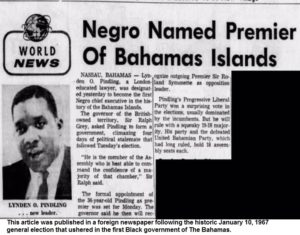
- The economics of mercantilism continued in the Caribbean, despite the dissolution of the colonial system. This meant, no manufacturing footprint in the regional markets; raw materials were exported to come back as finished goods. The end result: all Caribbean member-states boast only a service economy with consumption dynamics only.
- The Caribbean is arguably the greatest address on the planet, geography-wise. But the societal engines – economics, security & governance – are defective and inadequate for the majority of the population. As a result, the abandonment rate is very high, averaging 70 percent of tertiary-educated citizens in the independent member-states; plus 50 percent for the general population for the dependent territories (Puerto Rico, Virgin Islands, Netherland Antilles, French Islands, etc.). So we Lose our Best and have to nation-build with the Rest.
- Many American frontier cities – i.e. Miami – were built with the blood, sweat and tears of Caribbean people. These Black-and-Brown people will not leave – and they should not have to – despite how many outcries from racist and narrow-minded White People to “Go back to Africa”.
- Retirement life may be the best opportunity for the Caribbean to entice their Diaspora to return “home”. Home is NOT Africa. This is the reality of repatriation – if you have never lived there – it was never really home. For this reason, while we want to see prosperity in the African Motherland, we – the Caribbean – really do not need to compete with that continent.
Going back to Africa is not a new declaration for America towards Black people. First there was a voluntary movement in the late-1800’s. See the encyclopedia details here:
The Back-to-Africa movement, in the nineteenth century called the colonization movement, encouraged Americans of African ancestry to return to Africa — not to their original homelands, which in most cases were unknown, but to the continent. In general the movement was an overwhelming failure; very few Blacks wanted to move to Africa, and the small number that did — some under duress — initially faced brutal conditions. As the failure became known in the United States in the 1820s, it spawned the abolitionist movement. In the twentieth century Marcus Garvey, Rastafarians, and some other African Americans espoused the concept, but few actually left the United States.
Source: Retrieved August 27, 2019 from: https://en.wikipedia.org/wiki/Back-to-Africa_movement
Reflecting on the History of 400 Years of Slavery in America, reminds us that this American mainland is not really our homeland. Though we helped to build this country to make America great; see Appendix VIDEO below, it was not intended for greatness for the Black-and-Brown populations- we can only ever be immigrants; we will never be considered among the settlers. It is our assertion that the Caribbean Diaspora can be more successful at home in the Caribbean. We can more easily elevate our standing in society and our standard of living.
Yes, we can!
This is the purpose of the Go Lean movement. We urge every Caribbean stakeholder to lean-in to our roadmap to bring change to this Caribbean region. Yes, we can make our Caribbean homeland a better place to live, work and play.
About the Book
The book Go Lean…Caribbean serves as a roadmap for the introduction and implementation of the technocratic Caribbean Union Trade Federation (CU), for the elevation of Caribbean society – for all member-states. This CU/Go Lean roadmap has these 3 prime directives:
- Optimization of the economic engines in order to grow the regional economy to $800 Billion and create 2.2 million new jobs.
- Establishment of a security apparatus to ensure public safety and protect the resultant economic engines.
- Improve Caribbean governance to support these engines, including a separation-of-powers between the member-states and CU federal agencies.
The Go Lean book provides 370-pages of turn-by-turn instructions on “how” to adopt new community ethos, plus the strategies, tactics, implementations and advocacies to execute so as to reboot, reform and transform the societal engines of Caribbean society.
Download the free e-Book of Go Lean … Caribbean – now!
Who We Are
The movement behind the Go Lean book – a non-partisan, apolitical, religiously-neutral Community Development Foundation chartered for the purpose of empowering and re-booting economic engines – stresses that reforming and transforming the Caribbean societal engines must be a regional pursuit. This was an early motivation for the roadmap, as pronounced in the opening Declaration of Interdependence (Pages 12 – 13):
xi. Whereas all men are entitled to the benefits of good governance in a free society, “new guards” must be enacted to dissuade the emergence of incompetence, corruption, nepotism and cronyism at the peril of the people’s best interest. The Federation must guarantee the executions of a social contract between government and the governed.
xvi. Whereas security of our homeland is inextricably linked to prosperity of the homeland, the economic and security interest of the region needs to be aligned under the same governance. Since economic crimes … can imperil the functioning of the wheels of commerce for all the citizenry, the accedence of this Federation must equip the security apparatus with the tools and techniques for predictive and proactive interdictions.
xxiv. Whereas a free market economy can be induced and spurred for continuous progress, the Federation must install the controls to better manage aspects of the economy: jobs, inflation, savings rate, investments and other economic principles. Thereby attracting direct foreign investment because of the stability and vibrancy of our economy.
Sign the petition to lean-in for this roadmap for the Caribbean Union Trade Federation.
—————
Appendix VIDEO – “We Built This Country. Do Not Tell Us To Go Back Where We Came From.” – https://www.c-span.org/video/?c4814023/we-built-country-back-from
Posted August 24, 2019 – Virginia Lt. Governor Justin Fairfax at 400-Year Commemoration of 1619 Landing of Enslaved Africans in English North America.
